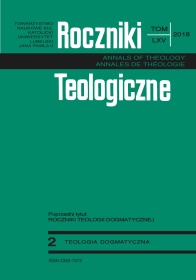Teologiczna hermeneutyka języka wiary
Abstrakt
Teologiczna hermeneutyka języka wiary w ujęciu Grabnera-Haidera jest teologicznym sposobem wyjaśniania, rozumienia i interpretowania całości języka wiary. Austriacki metodolog religii wyraźnie rozróżnia interpretację naukową od interpretacji przednaukowej i praktycznej, a także od argumentacji. Zauważa bardzo trafnie, że przy tej interpretacji mamy do czynienia z dwoma logicznymi językami prawidłowymi (Orthosprache). Jednym z nich jest język prawidłowy interpretatora, którym on nie mówi wprost o samym przedmiocie tekstu. Drugim jest język prawidłowy tekstu przekształconego. Oba te języki mogą się wzajemnie korygować, krytykować i modyfikować. Możliwe jest przejście od prawidłowego języka autora tekstu do prawidłowego języka interpretatora. I tu język prawidłowy autora tekstu można nazwać „Interpretandum”. To jest to, co powinno być interpretowane, rozumiane lub tłumaczone, zaś język prawidłowy interpretatora można nazwać „Interpretans”, czyli ten, za pomocą którego dokonuje się interpretacji, rozumienia lub tłumaczenia. W teologii jest więc miejsce dla właściwej hermeneutyki. Naukowa hermeneutyka, która zresztą zakłada analizę językową, stanowi tu przejście od prawidłowego języka analizowanego tekstu do prawidłowego języka interpretatora. Można też powiedzieć, że jest ona rozumieniem systematycznie uporządkowanego tekstu za pośrednictwem systematycznie uporządkowanego języka.
Bibliografia
Austin J.L., How to Do Things with Words, Oxford 1962.
Barth G., Hermeneutyka osoby, Wydawnictwo KUL, Lublin 2013.
Bartnik Cz.S., Możliwość stosowania analizy strukturalistycznej w teologii, „Znak” 25(1973), nr 228, s. 720-738.
Bartnik Cz.S., Hermeneutyka katolicka, EK, t. 6, kol. 774-779.
Bartnik Cz.S., Hermeneutyka personalistyczna, KUL, Lublin 1994.
Bronk A., Hermeneutyka, EK, t. 6, kol. 770-774.
Buxakowski J., Łaska Ducha Świętego i człowiek, Wydawnictwo „Bernardinum”, Pelplin 2007.
Bytniewski P., Hermeneutyka, PEF, t. 4, s. 383-386.
Coreth E., Grundlagen der Hermeneutik, Freiburg i. Br. 1969.
Duma T., Metafizyka relacji. U podstaw rozumienia relacji bytowych, Polskie Towarzystwo Tomasza z Akwinu, Wydawnictwo KUL, Lublin 2017.
Funke G., Hermeneutyka i język, przekł. B. Andrzejewski, Wydawnictwo Naukowe Instytutu Filozofii UAM w Poznaniu, Poznań 1994.
Funke G., Świadomość wiary. Hermeneutyka jako nauka o języku wiary w: tenże, Hermeneutyka i język, s. 103-136.
Gadamer H-G., Hermeneutyczny zwrot hermeneutyki pod znakiem języka, w: tenże, Prawda i metoda. Zarys hermeneutyki filozoficznej, przekł. B. Baran, Inter Esse, Kraków 1993, s. 353-442.
Góźdź K., Wiedza i wiara religijna, RT 63(2016), z. 2, s. 5-26.
Góźdź K., Teoria języka religijnego, RT 64(2017), z. 2, s. 5-32.
Grabner-Haider A., Glaubenssprache. Ihre Struktur und Anwendbarkeit in Verkündigung und Theologie, Herder, Wien 1975.
Grabner-Haider A., Semiotik und Theologie. Religiöse rede zwischen analytischer und hermeneutischer Philosophie, Kösel, München 1973.
Grabner-Haider A., Theorie der Theologie als Wissenschaft, Kösel, München 1974.
Grabner-Haider A., Verstehen und Erklären als theologisches Problem, „Wissenschaft und Weltbild” 25(1972), s. 296-304.
Jeanrond W.G., Hermeneutyka teologiczna. Rozwój i rozumienie, przekł. M. Borowska, Wydawnictwo WAM, Kraków 1999.
Lorda J.L., Łaska Boża, przekł. J. Lekan, Wydawnictwo KUL, Lublin 2012.
Lorenzen P., Hermeneutik und Wissenschaftstheorie aus der Sicht der konstruktiven Methode, w: Hermeneutik als Kriterium für Wissenschaftlichkeit?, red. U. Gerber, Loccum 1972, s. 129-134.
Ortiz O.A., Antropologia hermeneutica, Madrit 1973.
Ratzinger J., Opera omnia, t. IX/1: Wiara w Piśmie i Tradycji. Teologiczna nauka o zasadach, przekł. J. Merecki, red. K. Góźdź, M. Górecka, Wydawnictwo KUL, Lublin 2018.
Ricoeur P., Lapointe R., Panorama de l’hermeneutique actuelle, „Biulletin de theologie biblique” 2(1972), s. 107-156.
Ricoeur P., Le conflit des interprétations. Essais d’hermeneutique, Editions du Seuil, Paris 1969.
Ricoeur P., Interpretacja a refleksja: Konflikt hermeneutyczny, przekł. S. Cichowicz, „Studia Filozoficzne” 9(1986), s. 137-162.
Ricoeur P., Język, tekst, interpretacja. Wybór pism, przekł. P. Graff, K. Rosner, PIW, Warszawa 1989.
Smuniewski C., Wspólnota łaski. Charytologiczno-trynitarna eklezjologia, Wydawnictwo WAM, Kraków 2013.
Wittgenstein L., Lectures and Conversations on Aestetics. Psychology and Religious Belief, Oxford 1966.
Copyright (c) 2018 Roczniki Teologiczne

Utwór dostępny jest na licencji Creative Commons Uznanie autorstwa – Użycie niekomercyjne – Bez utworów zależnych 4.0 Międzynarodowe.





